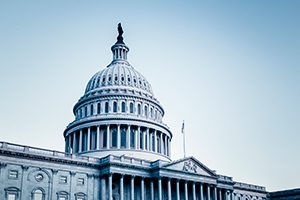CUPA-HR Files Comment Extension Request to USDA Regarding New Blacklisting Regulation for Federal Contractors
 On February 17, the U.S. Department of Agriculture (USDA) issued a Notice of Proposed Rulemaking (NPRM) outlining plans to impose new HR-related conditions on USDA contracts. If finalized, the rule would require federal contractors on projects procured by the USDA to certify their compliance with dozens of federal and state labor laws and executive orders. The proposal mirrors similar “blacklisting” regulations pursued by the USDA during the Obama administration.
On February 17, the U.S. Department of Agriculture (USDA) issued a Notice of Proposed Rulemaking (NPRM) outlining plans to impose new HR-related conditions on USDA contracts. If finalized, the rule would require federal contractors on projects procured by the USDA to certify their compliance with dozens of federal and state labor laws and executive orders. The proposal mirrors similar “blacklisting” regulations pursued by the USDA during the Obama administration.
The USDA provided only 32 days for stakeholders to submit comments on the proposal. CUPA-HR, along with several other higher education associations, filed an extension request with the department asking for an additional 90 days to “evaluate the NPRM’s impact on [members’] research missions and collect the information needed in order to provide thoughtful and accurate input to the USDA.” CUPA-HR plans to file comments on the proposal as well.
The new proposed rulemaking amends the Agriculture Acquisition Regulation (AGAR) to require federal contractors on USDA supply and service projects that exceed the simplified acquisition threshold to certify that they and their subcontractors and suppliers are “in compliance with” 15 federal labor laws, their state equivalents and executive orders. This includes, but is not limited to:
- Fair Labor Standards Act;
- Occupational Safety and Health Act;
- National Labor Relations Act;
- Service Contract Act;
- Davis-Bacon Act;
- Title VII of the Civil Rights Act;
- Americans with Disabilities Act;
- Age Discrimination in Employment Act; and
- Family and Medical Leave Act.
Additionally, federal contractors submitting offers for a project would be required to disclose to the USDA previous violations and certify they and their subcontractors “are in compliance with” any required corrective actions for those violations. They would also be required to alert USDA to any future adjudications of non-compliance.
In 2011, the USDA tried to implement a similar policy via a Direct Final Rule and NPRM, but was forced to withdraw both due to stakeholder pushback. CUPA-HR filed comments with the Society for Human Resource Management calling the rules arbitrary and capricious. Our comments also criticized the rules for not adequately clarifying how contractors were expected to comply with the changes and for imposing severe penalties. Additionally, CUPA-HR joined comments filed by the American Council on Education and several other higher education associations that argued the USDA’s rules “impose[d] an unmanageable compliance burden and uncertain compliance risk for colleges and universities that conduct agricultural research under contracts with the [USDA].”
Additionally, the Obama administration issued an executive order in July 2014 implementing a similar government-wide policy. The Federal Acquisition Regulation (FAR) Council and the Department of Labor issued regulations and guidance, respectively, implementing the order, but they were blocked by a federal judge in October 2016 for violating the First Amendment and due process rights. Congress also passed a Congressional Review Act challenge to the executive order in 2017, permanently withdrawing the executive order and barring the FAR Council from issuing any substantially similar regulations.
Unlike past proposals, this time the USDA has stated that the certifications will be subject to the False Claims Act (FCA), which provides for substantially increased liability. The FCA provides for treble damages and penalties and allows for private citizens to file suits on behalf of the government (called “qui tam” suits). Qui tam litigants receive a portion of the government’s recovery. According to the Department of Justice (DOJ), the awards to qui tam litigants in FCA suits topped $238 million in 2021. The same DOJ statistics show qui tam suits were the majority of FCA claims, with the government filing 203 new suits under FCA in 2021 compared to 598 qui tam suits in the same year.
CUPA-HR will continue to monitor this issue closely.


